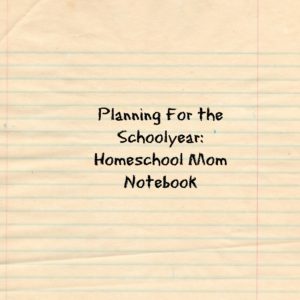A note to the homeschooling mom:
You’ve bought your curriculum, you’ve attended a convention, listened to a few podcasts about homeschool. You are pumped! You are really excited about the school year! As the beginning of school draws near, you begin to have doubts. You ask yourself, “What have I gotten myself into?” “Am I really suppose to do this?” “Can I do this?” My kids are getting older, do I have what it takes.?” My answer to you is yes you can, and you can do it well.
First of all, these questions are normal. We all have them anytime we embark on something new. And my answer to you is, “Yes, you can do this and you can do this well”. If you and your husband prayed about it, you are both in agreement, and both of you feel that the homeschooling lifestyle is right for you, then you should go down this path.
The biggest key to successful homeschooling is being organized. And I suggest that you over plan, plan, plan. Plan for the unexpected, the sick days, the days when everyone is simply tired and needs a break. I suggest that you buy yourself a binder, a big, fat binder that will become your brain. ALERT: If you are not a pen and paper gal, store this information on your online calendar, folder on your computer, or a planner app. When organizing your binder, make a section for the following:
- Calendar: Keep a school year calendar in your notebook. This way you can keep up with your days.
- Record Keeping: Include a copy of your state requirements. You can find them on the website for your state homeschool organization. That way you will know exactly what is required of you. Also, in the record keeping section include a copy of any communication you have had with local authorities including withdrawal letters, homeschool registration letters, and the like.
- Goal Setting: I always wrote out three to five yearly goals for each of my kids. For your little ones, a goal my be potty training or learning how to ride a bike. An example of academic goals may be learning beginning sounds. For your elementary aged kids, your goals my be to begin piano lessons or join a soccer league. Academic goals may be to learn their multiplication facts or learn how to write a 5 paragraph paper. For middle and high school kids, goals may be learn how to plan and cook a meal or learn how to drive. Academic goals may be to complete the entire Algebra book or read 5 pieces of classic literature. Each child is unique and each year your goals will change. Also include spiritual goals. If you child is having trouble with lying, plan to spend extra time with them and helping them see lying as a hinderance to their spiritual walk. Sometimes spiritual goals are not evident at the beginning of the year. Allow for extra time in your schedule to deal with spiritual issues as they arise.
- Lesson Planning: Along with writing goals, you will need to keep lesson plans. Lesson plans are simply how you plan to accomplish your daily lessons. You can write them for the month, the week or daily. Lesson plans are for you. They can be something as simple as writing the title of the lesson and page number from the book. If you are studying Native Americans and go to a local pow-wow, add it to your lesson plans. Also make a list of materials you need to complete the lesson and make sure you have them all in one place before you begin. This is especially important for completing a science experiment. Some science curriculums will provide a kit with all the materials and others don’t.
- List of curriculum:Make a list of all curriculum you use including any novels or supplemental materials.
- Grades/Test scores: Some states require grades and some don’t. When my kids were young, I did not grade everything, but as they got older, I found that grades made them more accountable. If you plan to keep grades, you can make a simple excel spreadsheet or do a web search and download a report card/transcript. Do what’s best for your family. Also, if you choose to have your children take a standardized test, this is a good place to keep their scores.
- Attendance: If your state requires that you keep a record of attendance, you can use your academic calendar for that.
- Extra-Curricular Activities: Keep a list of extra-curricular activities. This can include dance lessons, music lessons, sports, photography, 4-H, etc. Also list the field trips you take that do not coincide with your curriculum.
- Support group/Co-op Information: This is a great place to keep the directory, copies of newsletters, group calendar.
What about you? How do you keep up with everything you need to do?


 Enter your information below to receive regular blog updates in your inbox!
Enter your information below to receive regular blog updates in your inbox!
Leave a Reply